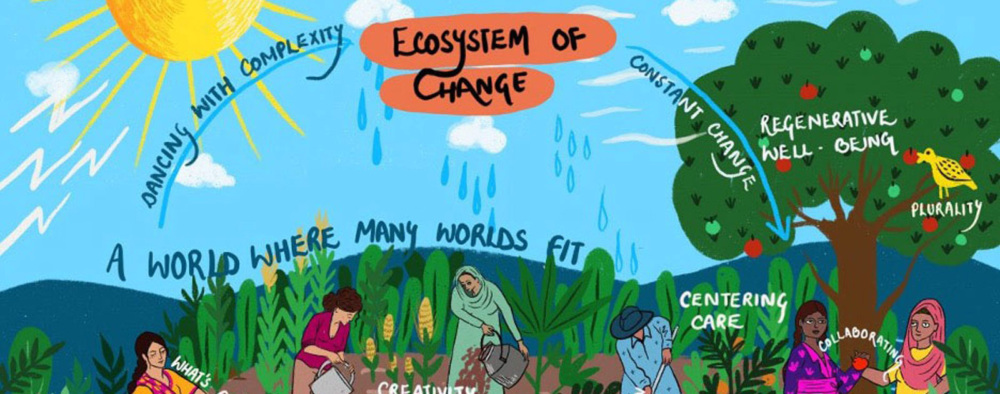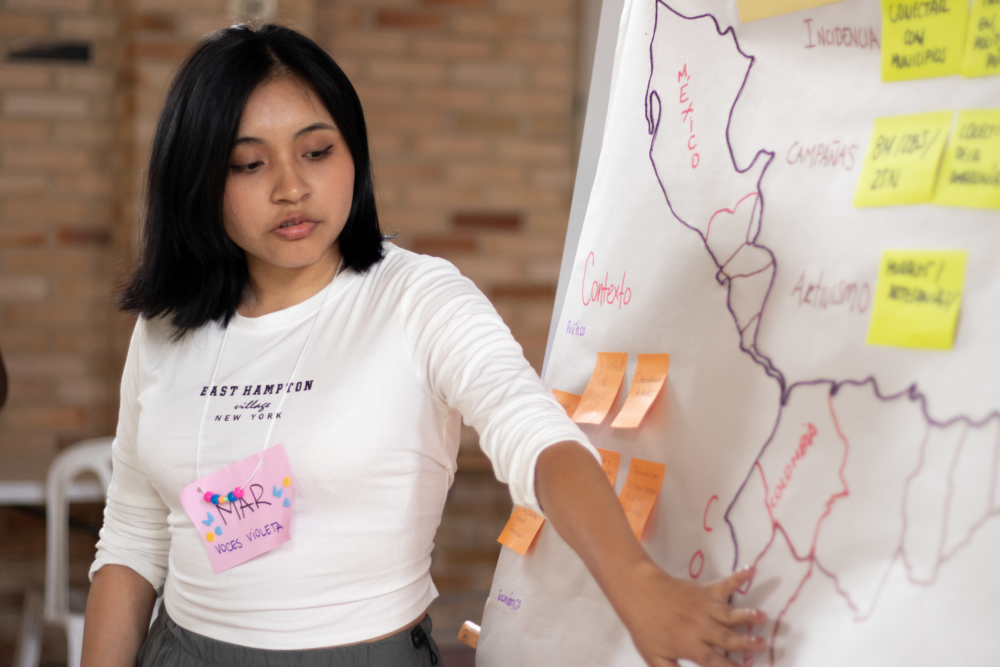
Youth power
Youth power
In this issue, we explore:
There is growing momentum in both US and global philanthropy to recognize that the wellbeing of changemakers matters and that funders can do more to prioritize it.
According to the Principles Project, launched by Human Rights Funders Network, Ariadne – European Funders for Social Change and Human Rights, and Philanthropy Advancing Women’s Human Rights (PAWHR), collective care is one of six human rights grantmaking principles: “As human rights funders, we should support our grantees to pursue holistic safety and protection (including physical safety, mental health, and digital security), as well as community care and healing.” In February, the Principles Project hosted a workshop exploring collective care. Check out the recording and the visual harvest.
[image_caption caption=”Image from the visual harvest developed during the Principles Project Collective Care workshop.” float=””]
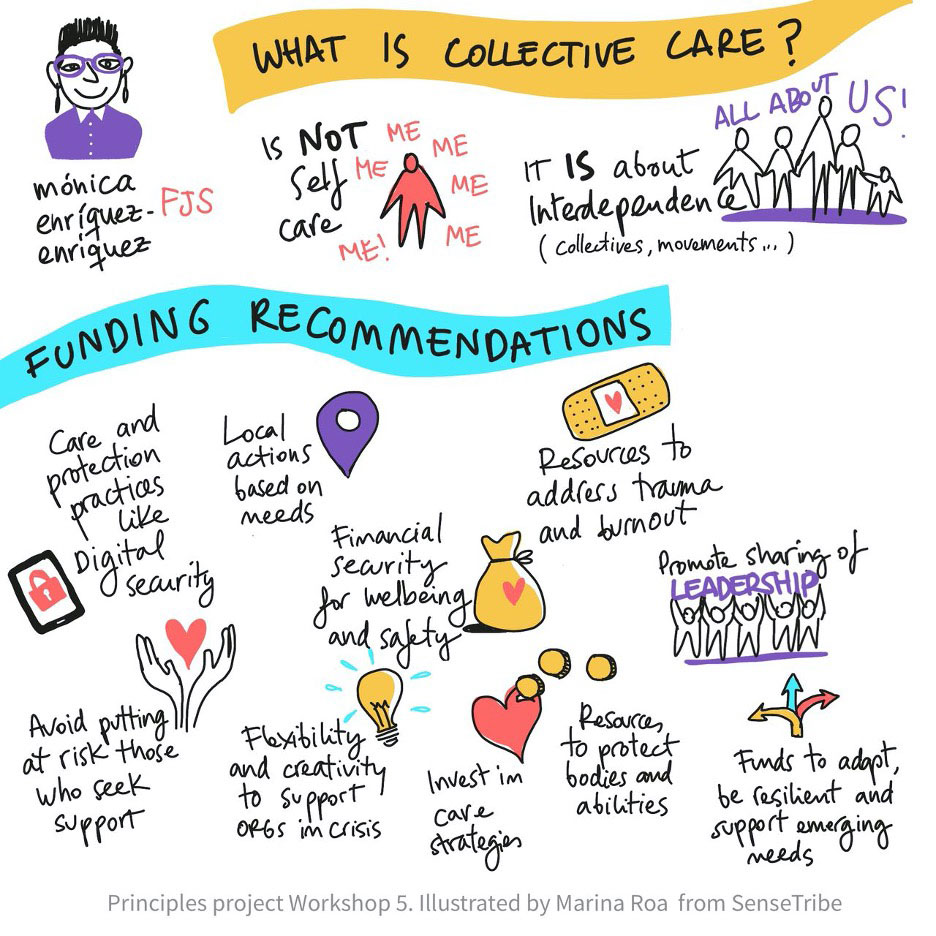
[/image_caption]
Youth activists face their own unique challenges as they navigate growing up and fighting for social change. That’s why we were excited to see Amnesty International launch Staying Resilient While Trying to Save the World (Volume 2): A Well-Being Workbook for Youth Activists. Designed by youth activists from around the globe and available in English, French, and Spanish, the workbook covers topics like stress and burnout, oppression and microagressions, intergenerational power dynamics, and inclusive language.
This growing momentum for wellbeing and collective care is grounded in listening to activists on the ground and their lived experiences. In openDemocracy, Tatiana Cordero Velásquez and Mónica Enríquez-Enríquez explore the deep history of care and healing in activism and urge funders to support protection and wellbeing to respond adequately to the ongoing crisis of democracy.
Centering wellbeing and collective care is an integral part of GFC’s work culture and commitment to change. Thank you to our partner Grantmakers for Effective Organizations for creating space in a Member Call in February and a Capacity Building Champions Experimental Call in March for GFC to explore this important topic with our peers and share what we are learning through our own wellbeing journey.
Our approach to wellbeing includes embracing some playfulness, fun, and quirkiness in our partnerships …
[image_caption caption=”GFC team members celebrate the success of partners’ outcomes as part of a participatory Outcome Harvesting evaluation process in the Empowering Adolescent Girls in Central America initiative. ” float=””]

[/image_caption]
[image_caption caption=”Drawing by Hannah Paterson in Grassroots Grantmaking: Embedding Participatory Approaches in Funding.” float=””]
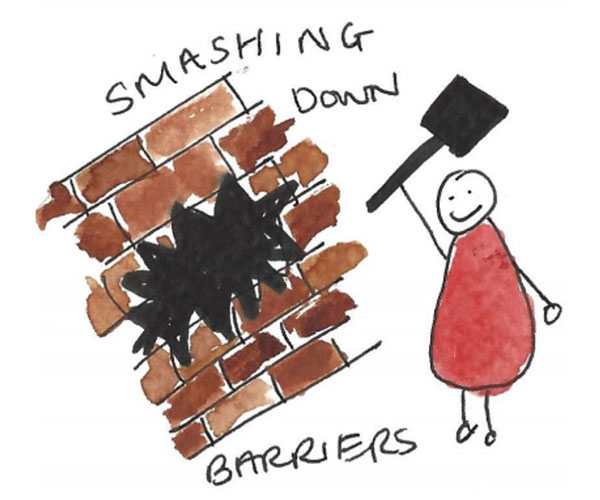
[/image_caption]
Across philanthropy, funders are looking at how to create equitable grantmaking practices to shift power. Participatory grantmaking is both an ethos and a process to redistribute power in philanthropy so that those most impacted by funding decisions are at the heart of decision-making itself.
Funders can explore the benefits, challenges, and strategies of this approach through the growing Participatory Grantmakers Community. This community of practice with over 250 practitioners recently launched the Twitter account @PGMcomm and will soon launch a platform with a resource library and events. Get in touch with us if you would like to be connected!
Young people are also important to engage as decision-makers in philanthropy and social change. As members of the With and For Girls Collective, GFC is inspired by the deep process of engaging girl activists and Collective members, which led to the launch of the With and For Girls Fund at Purposeful. The Fund aspires to disrupt and transform philanthropy by centering girls as decision-makers. The Fund encourages girl activists to submit creative profiles by text, voice note, or video, and calls on girl advisors to allocate funding to resource girls’ resistance across the globe. Together, girl activists and girl advisors will co-create spaces for learning, feminist political education, and self and collective care.
Here are some new resources that have inspired us more than ever to deepen how we engage local partners and youth in design, decision-making, and learning:
Join us to collaborate, listen, and learn with funders and organizations to support and strengthen safeguarding practices globally through the new Funder Safeguarding Collaborative (FSC)!
GFC is thrilled to host the Collaborative in partnership with Comic Relief, The National Lottery Community Fund, Oak Foundation, and Porticus.
Check out the FSC in the news, meet FSC Director Karen Walker-Simpson, and learn more about joining here!
Join us for United for a Better Future: A Global Conversation with Young Leaders about COVID-19 on Thursday, May 6, at 10:00AM EDT/3:00PM BST.
COVID-19 has had devastating impacts on education around the world, affecting more than 1.6 billion students and leaving 11 million girls at risk of permanently dropping out of school. Join a global conversation on education during COVID-19 to discuss these issues – and how we can build a more equitable world after the pandemic – with young female leaders from across the globe.
Register here. This event is part of GFC’s monthlong Celebration of Courage Campaign.
Indian illustrator, artist, and activist Vidushi Yadav inspires us with a series of drawings titled Creating new horizons: paths to shift power and imagination in development as part of a virtual gallery for shifting power by Oxfam’s Power Shifts project.
[image_caption caption=”One of the drawings by Vidushi Yadav from the series Creating new horizons: paths to shift power and imagination in development.” float=””]
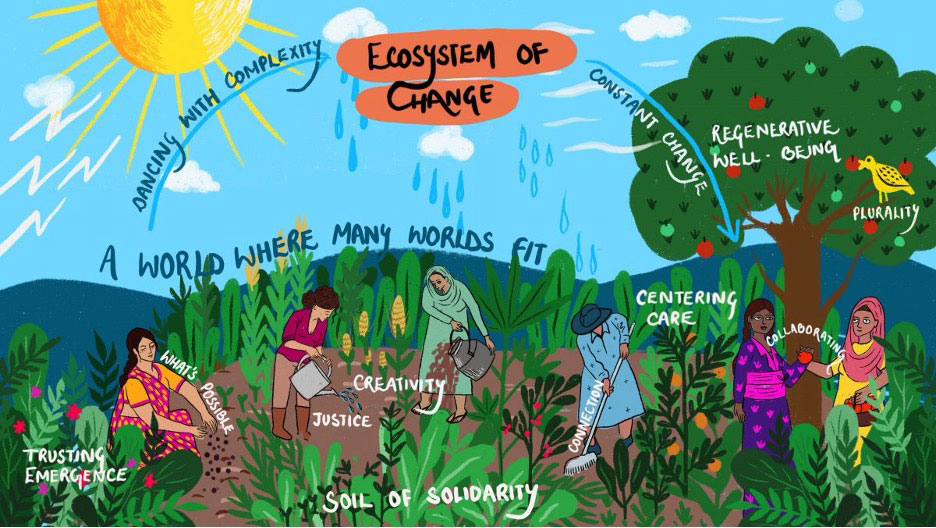
[/image_caption]
In reflecting on this drawing, Power Shifts Project Lead Maria Faciolince writes, “As Vidushi’s image shows, a systems approach is abundantly fertile; when we dance with complexity, and admit that what surrounds us is a deeply intricate and constantly evolving pluriverse, we can sow seeds of immense possibility, creativity, and regeneration. Through these lenses, we can draw new horizon lines of collective well-being, weaving a world where many worlds fit.”
When launching GFC’s Learning Playground, we asked ourselves, What is the history of playgrounds? And what do playgrounds mean for childhood imaginations and for us as adults today? In the article “An Intellectual History of the Sandbox,” we found some insights worth sharing.
Stay in touch!
Instagram | Facebook | Twitter | LinkedIn | YouTube
Sign up for our email updates, including our Grassroots Review and Partner Spotlights!
Header photo: One of the drawings by Vidushi Yadav from the series Creating new horizons: paths to shift power and imagination in development. © Vidushi Yadav
